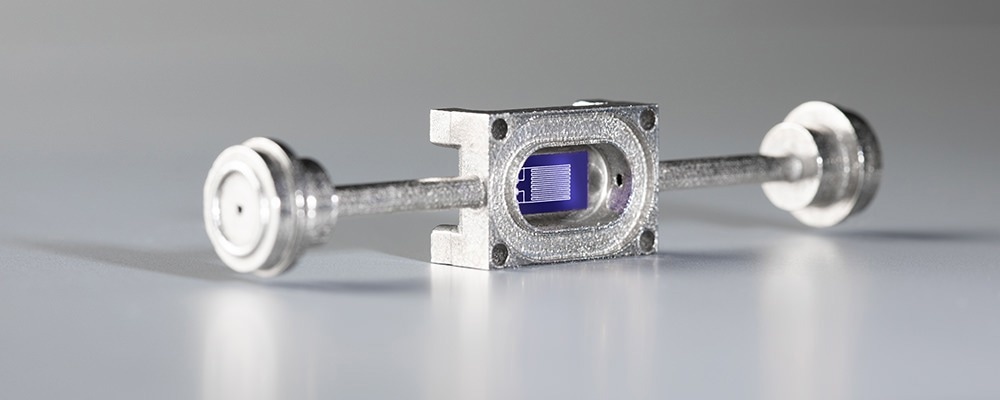From CSEMReviewed by Mychealla RiceSep 22 2022
CSEM is coordinating a high-profile EU-funded project to enhance the performance of thermal control systems by developing 3D-printed pipes with embedded sensors. In addition to potentially opening up new avenues of fundamental research for both CERN and the European space industry, these smart pipes could have uses in areas ranging from industrial heating and cooling systems to irrigation mechanisms for Industry 4.0. The project will reinforce Switzerland’s strengths in 3D printing and help anchor the country’s position at the forefront of innovation.

Image Credit: CSEM
The project, called Advanced Heat Exchange Devices (AHEAD), kicked off this summer and aims to revolutionize thermal control systems – critical components of a number of high-performance devices like satellites and space rockets. Most thermal control systems in use today are heavy, bulky and require a myriad of connection cables. With AHEAD, the goal is to develop systems that are compact, less expensive and wireless, allowing for real-time data collection and improved efficiency.
The project consortium, which consists of six partner organizations, intends to develop a new kind of 3D-printed pipe with temperature sensors and heating elements embedded in the pipe’s inner surface. The system will also include an energy recovery device to power the embedded electronics and enable automatic, wireless data transfer.
“Broadly speaking, we aim to develop technology bricks that can be used to integrate electronic components like cables, connectors and sensors into many different kinds of 3D-printed objects,” says Hervé Saudan, a project coordinator at CSEM. “The ability to embed sensors into process equipment will be an important feature of Industry 4.0. The data collected by these sensors can be used to feed artificial intelligence algorithms for process control, process optimization and predictive maintenance.” The consortium hopes to bring its technology to the pre-industrial stage and make it suitable for a broad range of applications including industrial heating and cooling systems, irrigation mechanisms, surgical instruments and implants, machine tooling, robotics and automotive parts.
The two applications that the project engineers are currently targeting are space modules and the CERN’s new particle detectors.
Pushing the Boundaries of Flow Measurement and Control
CERN plans to use the sensor-equipped pipes in the thermal control systems for the silicon detectors its engineers are currently developing. The detectors will be used to identify particles released from a multitude of collisions. Thanks to the pipes being created under AHEAD, the detectors’ thermal control systems will be able to run without the complicated cable set-up that’s usually required – thus saving space and allowing for better thermal control through temperature readings taken directly at strategic points. The new technology will also let engineers replace existing coolants with ones that are more effective and less damaging to the environment. “Technological breakthroughs are often needed before particle detectors can deliver the extraordinary performance that’s expected of them,” says Paolo Petagna, a CERN project manager. “These breakthroughs could lead to a totally new concept with applications well beyond the one originally intended, bringing benefits to important industries. That’s what we’re seeing with AHEAD.”
Pipes in Orbit
One of the project’s key partners – Thales Alenia Space (TAS) – is studying how the sensor-equipped pipes could be employed in the International Space Station’s pressurized modules and in NASA’s future Lunar Gateway space station. TAS also plans to install the pipes in two-phase mechanically pumped fluid loops, which are a type of thermal control system used in its telecommunications satellites. Martin Raynaud, a thermal specialist at TAS, explains: “The lighter, more compact design enabled by the pipes, along with improved precision in temperature measurements and faster assembly, are key benefits for us. They allow for better thermal control, which is a critical factor in all space systems. That gives us a significant competitive advantage over rivals in Europe and the US.”
Europe Tops the League Table, Ahead of China and the US
The AHEAD project is slated to last two years. It reflects Switzerland’s prominent position in innovation and its know-how in 3D-printing technology. “Switzerland is the European country with the most 3D-printing patent applications filed per capita,” says Saudan. “And Europe in general is at the top of this field. The number of patent applications has surged over the past few years, growing by 36% per annum between 2015 and 2018 according to a study by the European Patent Office. Today Europe leads the ranking, ahead of China and the US. This trend is a real boon to the Swiss economy, as the country’s competitiveness and ability to attract skilled workers depend largely on its capacity for innovation.”